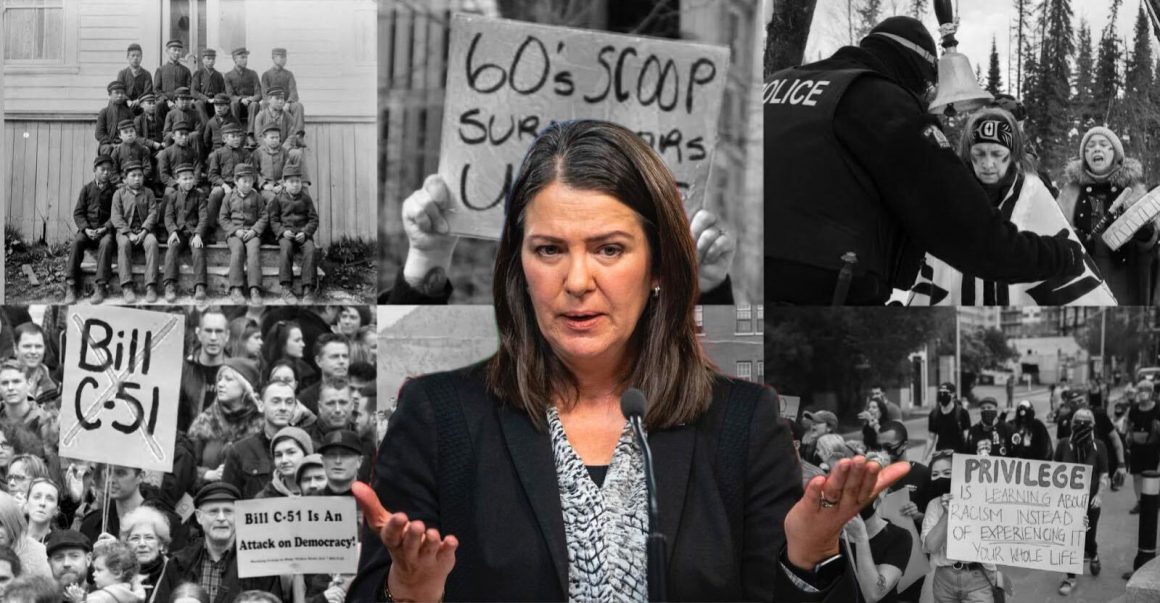
Historical events during Danielle Smith’s lifetime she might have missed
By Aymen Sherwani, October 27 2022—
Recently, the new Alberta premier Danielle Smith has made comments supporting unvaccinated persons and how they are “the most discriminated against group that I’ve ever witnessed in my lifetime.” The comments have been swarmed with widespread criticism online and from other voices in the Canadian political community. Smith, leading the province under the banner of the United Conservative Party (UCP), was born in 1971 — we thought it would be time to provide a historical lesson, with respect to discrimination, of her lifetime.
The Alberta Eugenics Board dissolved and forced sterilization ends (1972):
Smith would have been one-year-old when forced sterilization was made illegal in Canada — if her mother had been a person of interest to the Alberta Eugenics Board even just a year prior, she would not have been born. At the same time, forced sterilization practices still exist as an open secret within the Canadian healthcare industry as, most recently, 60 Indigenous women have come forward to file a class action lawsuit alleging that their fallopian tubes were tied without their consent as early as the late 80s.
The Sixties Scoop (1960s-1980s):
The Sixties Scoop was the government-approved mass removal of Indigenous children from their families, only to be placed in the foster care system — without the consent of their families. Children were kidnapped in the thousands — renamed, deprived of their cultural connection and abused due to their identities. Smith would have been around nine-years-old at most during this time, no doubt living parallel to the stolen generation who were forced to live with the consequences.
The Equal Credit Opportunity Act (1974):
Canadian women were not allowed to own credit cards until the Equal Credit Opportunity Act was passed in 1974 — meaning Smith’s own mother was unable to own a credit card until the now-premier was three-years-old. Prior to the act, banks were able to refuse Canadian women their credit cards — especially if they were unmarried. Good luck gaining financial independence as a queer person or widow without a husband to co-sign and verify that your hormones wouldn’t induce irrational overspending.
The last residential school was closed (1997):
Smith was 26-years-old when the last residential school in Canada — Kivalliq Hall in Rankin Inlet — was closed in 1997. In 1998, Smith won an elected seat in the Calgary Board of Education, being well into politics as early as her time as an economics major at our very own University of Calgary and serving as the president of the Progressive Conservatives club. These schools operated in every province in the country, with the largest number of them existing in Alberta. One would expect this close proximity of oppression to impact Smith’s understanding of what discrimination looks like — newsflash, it’s not irresponsible adults who are willingly choosing to prolong a global epidemic.
Amidst the controversy, Smith has forward to address her comments but falling short of an apology — instead, she defends her intentions.
“My intention was to underline the mistreatment of individuals who chose not to be vaccinated and were punished by not being able to work, travel or, in some cases, see loved ones,” she said, but failing to understand it means to spread a disease. “I did not intend to trivialize in any way the discrimination faced by minority communities and other persecuted groups […] we need to actively work together as Albertans and Canadians to end discrimination.”
If anything, Albertans are in for quite an interesting period until the upcoming 2023 provincial election.
This article is a part of our Voices section does not necessarily reflect the views of the Gauntlet editorial board.
